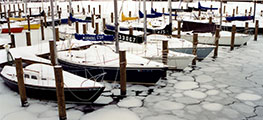- December 16, 2014
Tips for Winterizing Your Watercraft
Act Now to Ensure a Seaworthy Spring

As we enter the holiday season and transition into winter and colder weather, it’s important to safeguard your watercraft to ensure it will be prepared for spring.
Though it may seem like a tedious and sometimes expensive task, winterizing your boat can effectively and efficiently avoid costly repairs come springtime. If you live in an area facing elements of cold, snow and ice this winter, decommissioning your boat can protect your engine, plumbing system, and more.
To guide you in the winterization process, here are some tips to help improve your boat’s chances of surviving the winter season scot-free. Remember, you may always contact a marina or consult with a professional, if you do not feel comfortable completing the process yourself.
Land or Sea?
One of your major decisions will be whether to store your vessel in the water or ashore. If you choose to keep your boat in the water, make sure all thru-hulls are closed except for the cockpit drains. If you fail to protect the thru-hulls by closing the seacocks and gate valves, your boat may sink.
Generally, a boat that remains in the water requires more maintenance throughout the course of the winter. Keeping a boat out of water can protect its hull, but may allow extra cold-air exposure to its engine and freshwater systems. Whether you choose to store your boat in the water or ashore, you should be sure to remove all water from inside of the boat.
Beware of Water
Failure to drain water from the boat’s sea strainer is a common and costly mistake among those winterizing their boats, says NMU’s John Beachley. When stagnant water freezes in vessels, it can crack pipes and destroy boats. Such damages due to lack of winterization may not be covered by your boat insurance policy.
“It is crucial to drain water from all parts of the boat, including the sea strainer, engine blocks, air conditioning and plumbing systems,” says Beachley. “It may also be helpful to add non-toxic antifreeze to areas of the boat where water is typically contained, including the bilge, keel, and mechanical and plumbing-related systems.”
Antifreeze can also be run through the engine block – after it is properly winterized.
Caring for Your Engine
As they love to run, idle time during the winter can be troublesome for engines. Special care and attention is needed to keep your engine healthy, including fully flushing and cleaning it, as well as changing oil and oil filters. Be sure to lubricate other moving mechanisms that are prone to activity, including your shift and throttle mechanisms, as well as your steering system.
“Although your engine doesn’t require any fuel during the wintertime, manufacturers and shipyard staff differ on whether to leave your fuel tank full or empty during the winter,” says Beachley. “However, if you decide to fill your tank, be sure to add a fuel stabilizer and change fuel filters to keep dirt or moisture away from the fuel.”
After winterizing your engine and mechanisms, you should also secure your boat’s interior to prevent against theft or fire.
Interior Sweep
For safekeeping during the winter months, remove all valuable items from your vessel that may be susceptible to theft. This includes electronics, clothing, fishing gear, lifejackets and more.
You should also remove all food and beverages that may spoil due to moisture and cold weather, and remove flammable items such as charcoal, cooking fuels and paint thinners. One item you should be sure to keep on board is a fire extinguisher.
Once you’ve secured the interior of your boat, you’ll want protect the exterior from the harsh winter weather ahead.
Bundle Up
Investing in quality winter storage coverage can prevent decay to your boat. “Avoid using a bimini or tarp to cover your boat,” Beachley advises. “Instead, apply a well-made canvas or synthetic cover, or shrink wrap the craft. When you place the cover or shrink wrap around your boat, be sure to allow room for circulation or ventilation.”
To make sure she is safe and sound, we recommend visiting your boat from time to time this winter. And if you can’t be there, don’t hesitate to ask a friend or professional to check-in on her for you.
Act Now, Save Later!
As mentioned, damages due to lack of winterization may not be covered by your boat insurance policy. That’s why we recommend investing time and money to carefully winterize your watercraft this fall, before the snow and icy conditions fully take hold. Remember, it’s better to be safe than sorry – protect your vessel now for smooth sailing this spring!
This article is provided for general informational purposes only and does not constitute legal, risk management, or other advice. Readers should consult their own counsel for such advice.

